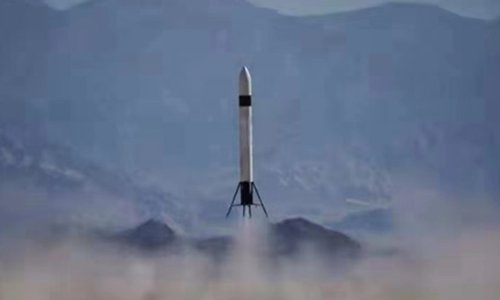HOME >> BUSINESS
China's private space sector eyes breakthrough with satellite launch by Jielong rocket
By Chu Daye Source:Global Times Published: 2019/8/14 21:33:40
Private space sector eyes breakthrough with satellite launch by Jielong rocket

China's largest and most advanced reusable rocket is successfully launched from Northwest China's Qinghai Province. Photo: courtesy of China's first private rocket company LinkSpace that launched the rocket
China's private space industry will see a new breakthrough as a Beijing-based space start-up will launch its homegrown satellite soon.
A satellite made by Beijing Qiansheng Exploration Technology Co has completed all pre-flight tests and will be put into orbit at an altitude of 540 kilometers by the Jielong rocket, citing information from the Jiuquan Satellite Launch Center, domestic news site cnstock.com reported on Wednesday
The launch will be a classic case of civilian-military integration, when a satellite made by a private company is taken into space on a rocket launched by a state-owned space enterprise.
The satellite, named Haichuang Qiansheng, is a dual-function satellite with remote-sensing and communication capacities.
According to Beijing Qiansheng, the satellite is by far the heaviest offering, weighs 65 kilograms, to be launched by any Chinese private satellite maker so far, and it's also the first dual-function satellite made by a start-up.
Miao Jianquan, founder and CEO of Beijing Qiansheng Exploration Technology Co, told the Global Times on Wednesday that this satellite is so far the most sophisticated satellite made by any start-up private company in China.
"From first line of codes to final completion, the satellite took 14 months to build," Miao said. "Such a time span will be shortened, perhaps to 10 months within the next two years, as production experience increases."
Last month, China's first private rocket launch was completed by iSpace, whose carrier rocket successfully sent satellites into orbit.
Jielong-1 is a solid propellant launch vehicle developed by the state-owned China Aerospace Science and Technology Corp. It will be China's first specially designated rocket for commercial missions.
Beijing Qiansheng, founded in 2017, said the satellite will be the first of a series that will eventually form a constellation of six satellites.
The company has attracted venture capital investors such as Shunwei Capital, the venture capital firm started by smartphone maker Xiaomi's founder and billionaire entrepreneur Lei Jun.
Wei Wuhui, a partner at SkyChee Ventures, which invested in start-up Commsat, said that investors are eyeing satellite start-ups these days.
"Investors see value in the scarcity of positions in the atmosphere and especially the radio frequency allocation, which is also a scarce resource," Wei told the Global Times on Wednesday.
Miao said that the proliferation of private company satellite could potentially change how the industry works.
"A key difference from state-backed satellite, this satellite has incorporated the needs of clients from the very beginning of its construction. In fact, clients have to pay in advance as well," Miao said.
"Now, with the launch date very near, the clients are already toning their earth-based equipment in anticipation of the satellite," Miao said, noting that it is uncommon to see such efficiency for a commercial process related to state-backed satellite.
In 2018, there were 2,100 functional satellites in the world, according to a report by the US Satellite Industry Association.
Countries and regions around the world launched 314 satellites in 2018, with 39 percent being remote-sensing satellites and 22 percent communication satellites.
China has about 200 satellites in orbit, according to media reports.
Newspaper headline: Private space sector eyes breakthrough with satellite launch by Jielong rocket
Posted in: INDUSTRIES,ECONOMY